Zack Snyder is certainly among the most creative of directors, whose work we have enjoyed since we first saw it in the Dawn of the Dead remake. He followed that up with 300 and Watchmen, carving a niche for himself with incredibly-stylish (and stylized) action films. Now, he’s working on a Girls With Guns movie, Sucker Punch, which he has described as “Alice in Wonderland with machine guns.” Set in the 1950’s, it’s about a young girl (Emily Browning) and her female friends, who need to escape a lunatic asylum before they are lobotomized. Here’s the trailer (that it uses Lords of Acid as the music is simply a bonus); it’s due out in March.
Author: Jim McLennan
Run! Bitch Run!
★★
“Grindhouse par excellence. Not convinced this is entirely a good thing, however.”
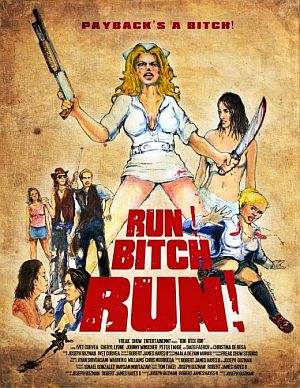 I can certainly appreciate where the makers are trying to go with this one. Two Catholic schoolgirls, selling Bible door-to-door to raise funds for their educational establishment. Unfortunately, they knock on the wrong door: this is actually a whorehouse, run by the psychotic Lobo (Tahoe), who has just killed one of his hookers. The two are kidnapped: one is killed, while the other (Lyone) is left for dead, naked, in the nearby woods. She is taken to hospital, but has only a single thought in her head: revenge. Stealing a nurse’s uniform, she checks out, intent on taking our her wrath on Lobo and his no-less depraved sidekicks.
I can certainly appreciate where the makers are trying to go with this one. Two Catholic schoolgirls, selling Bible door-to-door to raise funds for their educational establishment. Unfortunately, they knock on the wrong door: this is actually a whorehouse, run by the psychotic Lobo (Tahoe), who has just killed one of his hookers. The two are kidnapped: one is killed, while the other (Lyone) is left for dead, naked, in the nearby woods. She is taken to hospital, but has only a single thought in her head: revenge. Stealing a nurse’s uniform, she checks out, intent on taking our her wrath on Lobo and his no-less depraved sidekicks.
Particularly if you’ve seen the (thoroughly NSFW) trailer, you’ll know where this is heading, and it’s not a pleasant place. While entirely successful at evoking the grindhouse atmosphere, with its mix of sleazy, ugly sex and grimy violence, it also succeeds at being remarkably.. Well, boring is the word I’d use, and that’s close to an unforgivable sin as far as exploitation cinema goes. The pacing just seems off: it takes too long to get to what we actually want to see, which is these low-life scum getting their come-uppance. While the film does eventually deliver (Lobo’s fate will have you shifting uncomfortably), I must confess, my interest had waned well before that point.
The main problem, I think, is there is no emotional connection with the heroine. While there is an attempt to build her character early on, it’s not successful. A film like this largely stands or falls on its central performance; while Lyone is laudably game, she doesn’t have the acting chops to get the audience over on her side, and so the torments she undergoes have little or no impact, and neither does her revenge. The best grindhouse flicks achieve that connection on an almost visceral level, taking you to dark places you generally don’t want to go, and this only brushes against the edges there, making its flaws all that more obvious.
That said, I am still somewhat interested in seeing Guzman’s next work. Whatever his talents may lack elsewhere, the man has an undeniable eye for a title, and this one may even lack the grammatical issues found here. Coming soon: Nude Nuns with Big Guns.
Dir: Joseph Guzman
Star: Cheryl Lyone, Peter Tahoe, Ivet Corvea, Johnny Winscher
Alice in Wasteland
★★
“Washing-up proved marginally more interesting.”
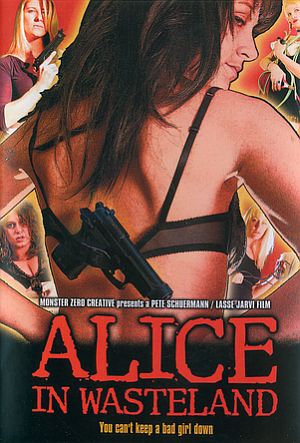 Ok, that brief is a little harsh, but it is true to say by the end, I had opted to double-task, and was watching this while I stood over the sink in the kitchen. It wasn’t as good as I expected: I was hoping for something along the lines of Faster, Pussycat, and instead got a turgid, over-extended crime drama. While it has all the right aspirations, the yawning chasm between that and its execution would require several days’ trip by mule to cross. Alice Wynn (Sondrup) is part of an armored-truck robbery, only to find herself double-crossed and left for dead by corrupt cop Jill Robbe (Beisner). Alice vows to recover the loot and take revenge on Robbe, and won’t let anyone – examples include her late mother’s boyfriend, psychotic pimp Ramrod or his Swedish assassin – stand in her way.
Ok, that brief is a little harsh, but it is true to say by the end, I had opted to double-task, and was watching this while I stood over the sink in the kitchen. It wasn’t as good as I expected: I was hoping for something along the lines of Faster, Pussycat, and instead got a turgid, over-extended crime drama. While it has all the right aspirations, the yawning chasm between that and its execution would require several days’ trip by mule to cross. Alice Wynn (Sondrup) is part of an armored-truck robbery, only to find herself double-crossed and left for dead by corrupt cop Jill Robbe (Beisner). Alice vows to recover the loot and take revenge on Robbe, and won’t let anyone – examples include her late mother’s boyfriend, psychotic pimp Ramrod or his Swedish assassin – stand in her way.
It’s not as good as it sounds, with the low-budget impediments and a largely amateur cast providing almost permanent blocks to success. About the only thing it shares with Faster, Pussycat is a complete lack of actual nudity – and unlike that, this doesn’t make up for that shortcoming in charisma. There are some amusing moments, such as adverts for a non-dairy product called “Pusé Whip”, or a film called Kill Jill, yet most of the individual scenes seem to solve little purpose except to get you to the next one – they’re just not very interesting on their own.
I did quite enjoy the two leads, with both Sondrup and Beisner surpassing the minimum necessary “Oomph” for their roles – the final scene together is perhaps the best thing about the movie (save the Swedish assassin). However, I don’t come into films expecting “the minimum necessary,” and when the other aspects largely fall short of even that mark, I have to confess that disappointment, and a resulting decision to get on with some housework, were the result. I’m left with the feeling that some things are perhaps best left to the professionals.
Dir: Lasse Jarvi and Peter Schuermann
Star: Roxane Sondrup, Michelle Beisner, Major Mandolin, Adam Ryan Villareal
Blood: The Last Vampire (live-action)
★★★
“Half-human, half-demon takes on her own kind. Haven’t we seen this before?”
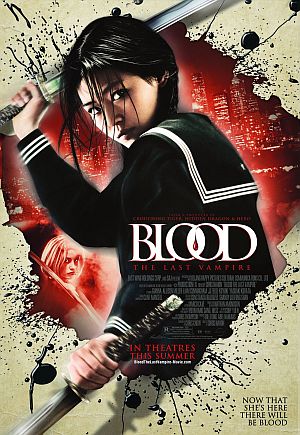 The animated version was one of the first reviews I wrote for the site, and I didn’t like it much – the fifty-minute running time allowed for hardly any development of scenario or characters at all. The feature fares a good bit better in these departments, though suffers from some horrendous editing styles and a couple of monsters which appear to have strayed in from a Playstation game (and I am not talking Playstation 3 here, either). The basic plot is retained. Saya (Gianna) is a half-demon with a grudge, intent on taking out Onigen (Koyuki), the one responsible for the death of her father. Working under the loose guidance of The Council, she is inserted into a school on an American air-force base in 1970 Japan. American girl Alice (Miller) has been added; Saya rescues her, and the two end up on the run, pursued both by Onigen and more regular forces.
The animated version was one of the first reviews I wrote for the site, and I didn’t like it much – the fifty-minute running time allowed for hardly any development of scenario or characters at all. The feature fares a good bit better in these departments, though suffers from some horrendous editing styles and a couple of monsters which appear to have strayed in from a Playstation game (and I am not talking Playstation 3 here, either). The basic plot is retained. Saya (Gianna) is a half-demon with a grudge, intent on taking out Onigen (Koyuki), the one responsible for the death of her father. Working under the loose guidance of The Council, she is inserted into a school on an American air-force base in 1970 Japan. American girl Alice (Miller) has been added; Saya rescues her, and the two end up on the run, pursued both by Onigen and more regular forces.
This wasn’t as bad as the reviews led me to expect, and Gianna goes a good job of capturing the permanently-peeved expression of Saya. There are certainly lots of fights, with Corey Yuen doing his usual solid work, though the cutting of these early on, renders them almost incomprehensible. Seriously: you have almost no idea who is doing what to who. However, that seems to change in the second half; there’s a very solid battle in the forest between Saya, her mentor, and an endless horde of minions, and the final battle between the heroine and Onigen certainly doesn’t lack for spectacularity…er, -ness. Or something.
Going against this, Alice’s presence seems no more than a sop to the international market, because she serves little or no purpose to the film otherwise. There’s also a thoroughly unsatisfactory sequence where Saya fights a flying monster on a truck, perched precariously in a gorge: it’s both incoherent and very badly-rendered, a combination that would shame a SciFi original movie. That said, it kept me entertained and awake, which is more than some films (coughSnowbloodcough) have been able to do this month. If Gianna wants another stab at an action heroine flick, I wouldn’t object.
Dir: Chris Nahon
Star: Gianna, Allison Miller, Liam Cunningham, Koyuki
Comic Con Girls
The ScreenTeamShow.com video spoofing California Girls by Katy Perry – the new version is called Comic Con Girls. It feels a little like something The Guild might have done, and that’s a pretty high compliment around these parts.
Lady Snowblood 1 + 2
★★½
Lady Snowblood
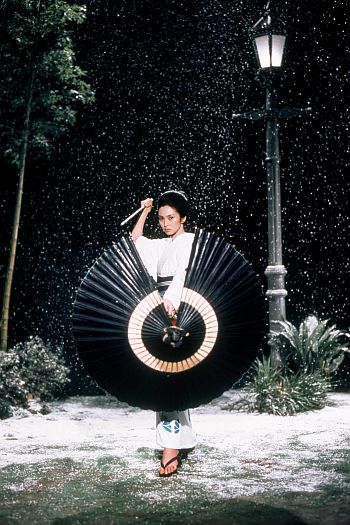 I’ll be honest: I was disappointed. I’d been looking forward to seeing this for a long while, but when we finally cranked it up on Monday, found it pretty dull. Truth be told, Chris was giving it loud Z’s by the end of the film, and I spent a few minutes closing my eyes and just listening to the dialogue. Which, since it was in Japanese, isn’t a good sign either. This was a surprise. A lot of people, whose views I generally respect, really like it, such as mandiapple.com, who called it “nothing short of a masterpiece.” Reading that, I had to check they were reviewing the same film. Because, personally, while its influence on Kill Bill is undeniable, that is a far more effective piece of work.
I’ll be honest: I was disappointed. I’d been looking forward to seeing this for a long while, but when we finally cranked it up on Monday, found it pretty dull. Truth be told, Chris was giving it loud Z’s by the end of the film, and I spent a few minutes closing my eyes and just listening to the dialogue. Which, since it was in Japanese, isn’t a good sign either. This was a surprise. A lot of people, whose views I generally respect, really like it, such as mandiapple.com, who called it “nothing short of a masterpiece.” Reading that, I had to check they were reviewing the same film. Because, personally, while its influence on Kill Bill is undeniable, that is a far more effective piece of work.
The plot in both is needlessly-convoluted, but it has much more of a negative impact here. Here is the story, in chronological order. In late 19th-century Japan, a mother sees her husband and young son slaughtered by a group of four con-artists; she is kidnapped and raped over a period of several days before being abandoned. She vows revenge, but is arrested after killing only one of the four, and sent to prison for life. There, she has a baby daughter, Yuki, spawned for the sole purpose of continuing the revenge. After the mother dies in jail, Yuki is released with another prisoner, and begins her training under a tough Buddhist priest (Nishimura). When she reaches her twentieth birthday, she leaves, to start her mission.
The problems here are multiple, not least that Yuki is just too cold. She might as well be an automaton, as she progresses on her vengeance, showing no emotion or feeling, and it’s hard to feel empathy for her. Yes, she is supposed to be a cold-hearted killing machine, but the performance here is devoid of all humanity. There’s nothing personal here either. Yuki is not the victim; the events in question occurred before she was even conceived, giving her no direct stake in proceedings – she is simply a tool, wielded from beyond the grave by a mother she never really knew. Contrast Kill Bill, where the Bride sees her husband-to-be slaughtered at the altar. As motivation, it’s far superior and resonates much more with the audience.
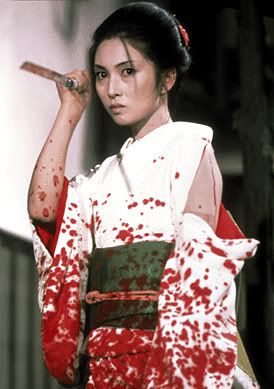 Then there’s the action, which is second-rate at best. It may have seemed cutting-edge when the film was released in 1973. Approaching forty years later… Not so much. There’s little sense that anyone – good or bad – has true sword skills, and the battles are largely brief and perfunctory. Admittedly, the arterial spray is enthusiastic – clearly the high blood-pressure epidemic affecting Japan is not a new phenomena – and looks very pretty on the snow backdrop which is frequently used. However, that can only go some way to overcoming the flaws in the characterization: one suspects the original manga, by Kazuo Koike (who also did Lone Wolf and Cub), perhaps had more room to be better developed in this area. And while we’re at it, what’s with the anachronistic jazz soundtrack, dating from a good half-century after this is set? Any sense of period atmosphere is completely destroyed, every time it cranks up.
Then there’s the action, which is second-rate at best. It may have seemed cutting-edge when the film was released in 1973. Approaching forty years later… Not so much. There’s little sense that anyone – good or bad – has true sword skills, and the battles are largely brief and perfunctory. Admittedly, the arterial spray is enthusiastic – clearly the high blood-pressure epidemic affecting Japan is not a new phenomena – and looks very pretty on the snow backdrop which is frequently used. However, that can only go some way to overcoming the flaws in the characterization: one suspects the original manga, by Kazuo Koike (who also did Lone Wolf and Cub), perhaps had more room to be better developed in this area. And while we’re at it, what’s with the anachronistic jazz soundtrack, dating from a good half-century after this is set? Any sense of period atmosphere is completely destroyed, every time it cranks up.
What works is mostly the visual style, and it’s soundly put together from a technical aspect. Kaji, who plays the adult Yuki, is also solid enough, though was probably better – even if she said less! – in the Female Convict Scorpion series [I must get round to reviewing the excellent Jailhouse 41 here some time, though it won’t be till after we move house in October, and the DVD re-surfaces…]. I also liked the chaste purity here: Yuki doesn’t have any real relationships at all – she lives purely for revenge. However, I feel much the same way about this, that I did about the original Night of the Living Dead. While it certainly deserves to be respected for its influential place in the history of the genre, it feels as if the elements seen here have been revisited with greater success, by those who followed in its foot-steps.
Dir: Toshiya Fujita
Star: Meiko Kaji, Ko Nishimura, Toshio Kurosawa, Masaaki Daimon
★★
Lady Snowblood 2: Love Song of Vengeance
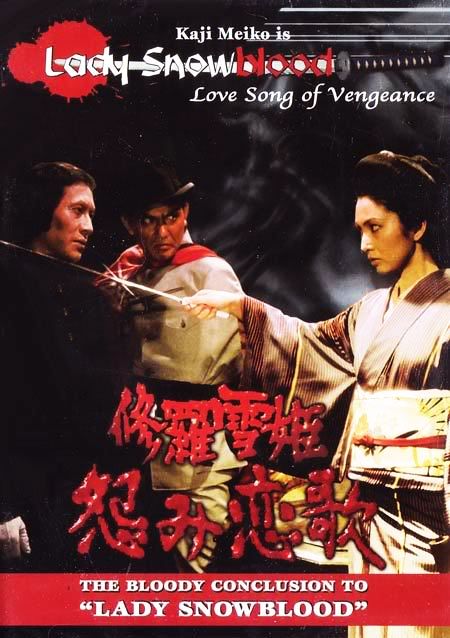 I was hoping that the second film would show me why this series has such a solid reputation, but was even more disappointed by the sequel than the original. There’s a striking opening, where Yuki basically walks out of an ambush, hardly bothering even to pay attention to the men circling her – except to slaughter them. Unfortunately, it’s pretty much downhill from there, with proceedings getting badly bogged down in even more of the political shenanigans that we saw in part one. Yuki is arrested and sentenced to death for her 37(!) murders, but is rescued by the chief of the secret police, Kikui Seishiro (Kishida), who sends her on a mission against nihilist Ransui Tokunaga (Itami), perceived as a threat to the order of things.
I was hoping that the second film would show me why this series has such a solid reputation, but was even more disappointed by the sequel than the original. There’s a striking opening, where Yuki basically walks out of an ambush, hardly bothering even to pay attention to the men circling her – except to slaughter them. Unfortunately, it’s pretty much downhill from there, with proceedings getting badly bogged down in even more of the political shenanigans that we saw in part one. Yuki is arrested and sentenced to death for her 37(!) murders, but is rescued by the chief of the secret police, Kikui Seishiro (Kishida), who sends her on a mission against nihilist Ransui Tokunaga (Itami), perceived as a threat to the order of things.
That’s because Tokanaga and his wife are in possession of a document that could seriously embarrass the government, by proving their involvement in the deaths of Tokunaga’s partners. When Yuki discovers this, she switches sides, though Tokunaga is arrested, tortured and, when he fails to give up the document’s location, injected with bubonic plague [interestingly, this is a decade before the biological weapons work of Unit 731 during WW2 became public knowledge in Japan] and dumped in the slums as a warning to others. Yuki teams up with Tokunaga’s estranged brother, and sets out to take revenge on the government forces responsible for his death.
This is set just after the Russo-Japanese war of 1905, and I’ve a feeling is meant in some way to parallel the political situation of the 1970’s. However, all such sentiment is entirely wasted on Western viewers watching it almost forty years after it was made. If you’re looking at this as an action movie, it plays out in a manner best described as turgid, with very sporadic action, to such an extent that it hardly qualifies as such at all – if it weren’t for the original, I doubt I’d be covering it here. Even the arterial gushiness seems to be less unenthusiastic and sprayful than previously.
On the other hand, Kaji’s portrayal is more emotionally-disengaged this time, and it’s even harder to develop sympathy for a character engaged in some kind of obscure political activism, rather than personal revenge. It’s what perhaps makes this one’s closest cousin V For Vendetta, with samurai swords. And, in case you were wondering, that is not meant to be much of an endorsement. I’d say you are far better off watching the futuristic remake, The Princess Blade or even the better entries in the Crimson Bat series than either of these films, and given my high hopes coming into these, based on their reputation, that’s extremely disappointing.
Dir: Toshiya Fujita
Star: Meiko Kaji, Juzo Itami, Kazuko Yoshiyuki, Shin Kishida
The Haunted World of El Superbeasto
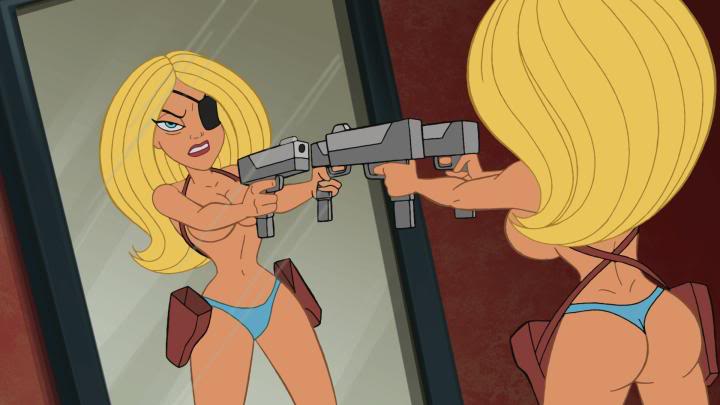 ★★★★
★★★★
“Suzi-X Marks The Spot.”
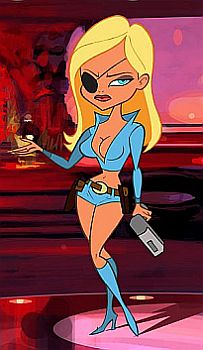
 Rob Zombie has had an interesting career, to say the least. From the early days as the front-man of heavy-metal band White Zombie, through his own solo work [heavily influenced by B-movies], and then on into his movies. That started with the fairly-crap House of 1000 Corpses, then the better Devil Rejects, and then his remakes of the first two Halloween movies, which were ok, as remakes of horror classics go. And then there’s The Haunted World of El Superbeasto, an animated feature which I stumbled across on cable. Well, actually, Chris did: “I Tivo’d a movie for you,” she said. And, surprisingly, she stayed for the entire thing, and appeared to enjoy this animated feature. Which is odd, because it has much the same gleeful, excessive insanity as Bitch Slap, which she walked out on.
Rob Zombie has had an interesting career, to say the least. From the early days as the front-man of heavy-metal band White Zombie, through his own solo work [heavily influenced by B-movies], and then on into his movies. That started with the fairly-crap House of 1000 Corpses, then the better Devil Rejects, and then his remakes of the first two Halloween movies, which were ok, as remakes of horror classics go. And then there’s The Haunted World of El Superbeasto, an animated feature which I stumbled across on cable. Well, actually, Chris did: “I Tivo’d a movie for you,” she said. And, surprisingly, she stayed for the entire thing, and appeared to enjoy this animated feature. Which is odd, because it has much the same gleeful, excessive insanity as Bitch Slap, which she walked out on.
Based on a comic-book series, the focus is, at least, theoretically, El Superbeasto (Papa), a masked luchador and part-time exploitation film-director, whose opinion of his own talents is certainly not modest. Superbeasto gets involved with the the evil plans of Dr. Satan (Giamatti), who kidnaps foul-mouthed stripper Velvet Von Black (Dawson), because if he marries her, he’ll get all the powers of the devil. El Superbeasto and his sister Suzi X (Moon Zombie) have to stop Dr. Satan, before he can destroy the world. And it’s thanks to the latter that this film effortlessly slides into GWG territory. Imagine a soft(ish) porn version of those insurance ads with Erin Esurance kicking butt. Except, with far larger breasts, much more gore and a sidekick of a horny, transforming robot. Er, ok: not really like those insurance ads at all, then.
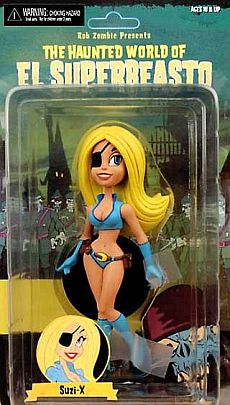 Zombie was responsible for the Werewolf Women of the SS faux-trailer in Grindhouse, and brings much the same gleeful approach to proceedings here. Indeed, we first see Suzi-X kidnapping the head of Hitler, which is kept alive in a jar (as in They Saved Hitler’s Brain), and then has to escape by fighting her way through a massive pack of Nazi zombies (that’d be from Shock Waves). Carnage ensues, as it pretty much does, any time Suzi-X is on the screen, which is a lot – she gets far more of the action than El Superbeasto does. Proceedings culminate in a lengthy, slo-mo catfight, entirely necessary to the plot, between her and Von Black, while the soundtrack cheerily informs us that “It’s OK to jerk off to cartoons – the Japanese do it every day – so rub one out for the USA…”
Zombie was responsible for the Werewolf Women of the SS faux-trailer in Grindhouse, and brings much the same gleeful approach to proceedings here. Indeed, we first see Suzi-X kidnapping the head of Hitler, which is kept alive in a jar (as in They Saved Hitler’s Brain), and then has to escape by fighting her way through a massive pack of Nazi zombies (that’d be from Shock Waves). Carnage ensues, as it pretty much does, any time Suzi-X is on the screen, which is a lot – she gets far more of the action than El Superbeasto does. Proceedings culminate in a lengthy, slo-mo catfight, entirely necessary to the plot, between her and Von Black, while the soundtrack cheerily informs us that “It’s OK to jerk off to cartoons – the Japanese do it every day – so rub one out for the USA…”
Yeah, the soundtrack. By comic due Hard ‘n’ Phirm, it’s certainly worthy of note, providing a sardonic commentary throughout. Witness the play-by-play as Suzi-X takes on the Nazi zombies, or as it bemoans the shameless ripoff of Carrie which is the finale. An appreciation of genre – particularly, horror movies – of the past eighty years or longer, will also help, as will as realizing this is not to be taken at all seriously. It’s definitely not for kids, or the easily offended: copious female nudity, violence, swearing and generally questionable attitudes. It reminded me of Ralph Bakshi cartoons, such as Fritz the Cat, just much more tongue-in-cheek.
If anything, it may be a little too hyper and frenetic. We ended up taking a break in the middle, and chilling out with coffee and muffins before returning for the second-half. Throwing together everything but the kitchen sink as far as style, content and approach goes, it remains a thoroughly entertaining piece of trash cinema. While the supposed hero is actually not very interesting, and largely unlikeable, Suzi-X is a fabulous action heroine, whom I’d enjoy seeing more of [not that there’s much you don’t see of her here, if you know what I mean, and I think you do…] Check out the clip below for some idea of what to expect.
Dir: Rob Zombie
Star (voice): Tom Papa, Sheri Moon Zombie, Paul Giamatti, Rosario Dawson
Whiteout
★½
“CSI: Antarctica. Only, without the actual, y’know, interest…”
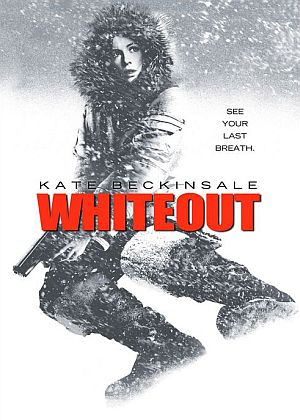 “Oh, look,” I said to Chris. “Whiteout is just starting. It’s about a US marshal investigating a murder in Antarctica. Let’s take a look, shall we?” And, of course, the first thing we see is Kate Beckinsale bending over in her underwear, as she undresses to take a shower. I haven’t heard her eyes whirring as they rolled in her skull like that, probably since the first 20 minutes of Bitch Slap. I’ll have to sit through a few Ghost Whisperer episodes to make up for that. God forbid, maybe even stay awake for one. The sad news is, that was probably the most memorable moment in a film which, on balance, is marginally less interesting than the weather phenomena name-checked in the title.
“Oh, look,” I said to Chris. “Whiteout is just starting. It’s about a US marshal investigating a murder in Antarctica. Let’s take a look, shall we?” And, of course, the first thing we see is Kate Beckinsale bending over in her underwear, as she undresses to take a shower. I haven’t heard her eyes whirring as they rolled in her skull like that, probably since the first 20 minutes of Bitch Slap. I’ll have to sit through a few Ghost Whisperer episodes to make up for that. God forbid, maybe even stay awake for one. The sad news is, that was probably the most memorable moment in a film which, on balance, is marginally less interesting than the weather phenomena name-checked in the title.
After an incident in which she blasted her dirty-cop partner out of a high window, Carrie Stetko (Beckinsale) takes refuge in a post at the South Pole. A body is found out on the remote ice, and turns out to be part of a research team – though their camp is nowhere in the area. Stetko gets a call from one of the remaining members of the team, and goes to meet him at a remote station, only to find him dead and be attacked by a masked figure with an ice-axe. Shortly afterwards, she meets UN security agent Robert Pryce (Macht); initially suspicious, it turns out they have to work with each other and find out what is going on, as a massive storm heads towards their base, forcing the early evacuation of everyone else on it.
Memo to the makers. A crap, non-thrilling “thriller” doesn’t get any better because it’s dumped in a frozen wasteland, even if that means you can add interminable sequences of people shuffling between buildings while holding on to ropes. Chunks of this make little or no sense: after Stetko is attacked by the ice-axe wielder, she inexplicably fails to investigate at all, even though he must still be on the base, as there’s nowhere much else to go. This kind of logical flaw plagues the film, and wastes what might have been a good idea – especially if they’d gone with two female leads, as in the comic-book which inspired it. The whole thing is entirely forgettable. Unfortunately, I suspect Chris probably won’t let me do so for quite a while…
Dir: Dominic Sena
Star: Kate Beckinsale, Gabriel Macht, Columbus Short, Tom Skerritt
Angel of Death (2009)
★★★½
“A star is born? Well, at least a potential one.”
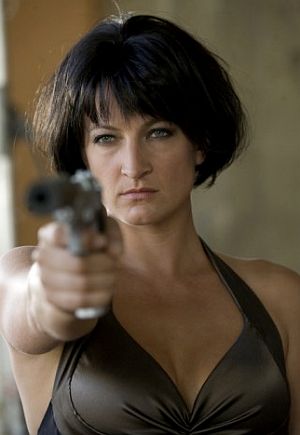 After making an undeniable impact strapped to a car bonnet in the second-half of Grindhouse, Zo…Hang on, let me find the right key on the keyboard… Ah, there we are… Zoë gets to do some actual ‘acting’, rather than playing a stuntwoman called Zoë Bell [Way to go, Tarantino!] Thios started as a web-based series of ten episodes, but is now available on DVD, which is how we watched it. Bell plays Eve, an assassin whose personality radically changes after she is stabbed in the head. She starts to see one of her victims – a young girl – and as a result, decides to go after those who ordered the death. Needless to say, her manager and handler Graham (Poth) is not impressed by this sudden burst of morality, and neither are those who have now become her target, including up-and-coming gangster boss Jake Abel, who sends his minions out to take care of her before she takes care of him.
After making an undeniable impact strapped to a car bonnet in the second-half of Grindhouse, Zo…Hang on, let me find the right key on the keyboard… Ah, there we are… Zoë gets to do some actual ‘acting’, rather than playing a stuntwoman called Zoë Bell [Way to go, Tarantino!] Thios started as a web-based series of ten episodes, but is now available on DVD, which is how we watched it. Bell plays Eve, an assassin whose personality radically changes after she is stabbed in the head. She starts to see one of her victims – a young girl – and as a result, decides to go after those who ordered the death. Needless to say, her manager and handler Graham (Poth) is not impressed by this sudden burst of morality, and neither are those who have now become her target, including up-and-coming gangster boss Jake Abel, who sends his minions out to take care of her before she takes care of him.
As an action actress, Bell is unquestionably better at the “action” part than the acting. Not that she sucks at the latter, but one senses she needs more experience with regard to the thespian side of things. This is her first time having to carry a film while playing a character, and thst sometimes is obvious – it’s particularly interesting to contrast Bell and Lucy Lawless, who turns up in a supporting role as Eve’s next-door neighbour. The script also fails to make a convincing case why she makes the switch – maybe it’s the head-injury, but that’s a bit too deus ex machina to work well, and as this barely runs 70 mins, it’s not exactly something they needed to cut out.
Still, this is all redeemed by some excellent action, with Bell (obviously) doing all her own work. She has a short, compact fighting style that looks great on the camera, and there’s a real sense of hardcore energy to it, that makes them fun to watch. Having seen her start off by getting stabbed in the skull, and literally walking away, establishes Eve nicely as an unstoppable force, who can take a licking and keep on ticking. Wisely, Etheredge appreciates that without a stunt-double, there’s no need for quick cutting, and gives the viewer a chance to appreciate her skills. The result is an entertaining B-movie that will hopefully lead to bigger and better things for Bell, who might just become a genuine star down the road.
Dir: Paul Etheredge
Star: Zoë Bell, Brian Poth, Jake Abel, Justin Huen
Reign of Assassins trailer
Michelle Yeoh is back! Hurrah! She would certainly be one of the inaugural members of the Girls With Guns Hall of Fame [opening soo…er, eventually], and so it’s great to see the star of Yes, Madam! and Crouching Tiger back in the action heroine genre. And she doesn’t seem to be slowing down, even as she approached her fiftieth birthday. This is Reign of Assassins, the film co-directed by John Woo, which is due for release in the fall.




